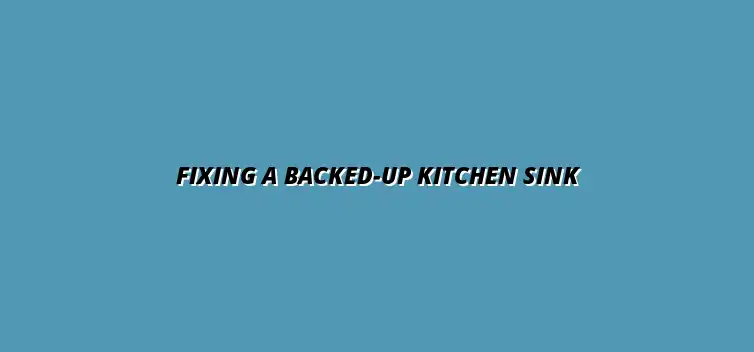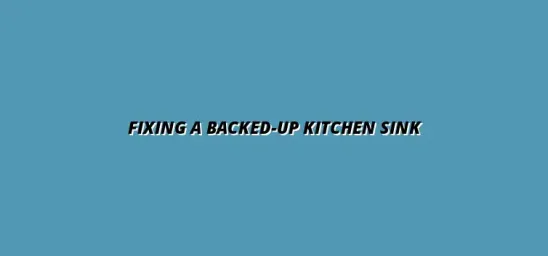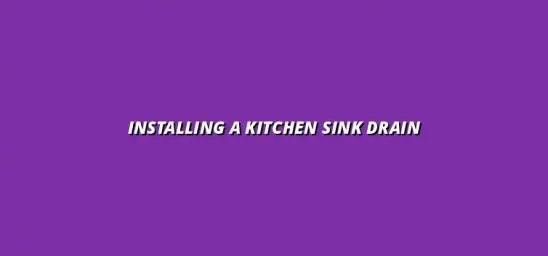
Fixing a Backed-Up Kitchen Sink
Understanding the Causes of Kitchen Sink Backups
Kitchen sink backups can be a real hassle. They often disrupt daily activities and may even lead to more significant plumbing issues if not addressed quickly. To effectively tackle this problem, it's essential to understand the common causes that lead to these frustrating backups.
In this article, we will explore various reasons your kitchen sink might be experiencing these issues. From simple clogs to complex plumbing faults, knowing the root cause can help you find the right solution!
Common Reasons Your Kitchen Sink is Backing Up
There are a few common culprits behind kitchen sink backups. Understanding these can save you time and help you take action before the problem worsens. Here are the main reasons to consider:
- Clogged Drain Pipes: A major reason for backups.
- Grease Buildup: Often sneaky and hard to spot.
- Food Waste and Debris Accumulation: Regular disposal can lead to clogs.
Clogged Drain Pipes: A Major Culprit
One of the most frequent reasons for kitchen sink backups is clogged drain pipes. Over time, food particles, grease, and other debris can accumulate within the pipes, causing a blockage. This buildup restricts the water flow and can lead to slow draining or complete stoppage. For helpful tips on clearing slow drains naturally, check out this guide on how to clear slow drains naturally at home.
Regular maintenance, such as flushing the pipes with hot water, can help keep them clear. If the clog becomes severe, it may require professional intervention to avoid damage to the plumbing system.
Grease Buildup: The Silent Sink Saboteur
Grease buildup is another common issue that many people overlook. When cooking, grease can stick to the insides of your pipes and gradually build up over time. This can create a thick sludge that traps food particles, leading to significant clogs.
To prevent grease buildup, dispose of cooking oils and animal fats properly. Avoid pouring them down the drain, as they will solidify and cause serious problems later!
Food Waste and Debris Accumulation
Food waste and debris can accumulate in the sink and drain, contributing to backups. Even if you have a garbage disposal, not everything is suitable for this appliance. Items like fibrous vegetables, starchy foods, and large chunks can cause issues. Learn more about preventing kitchen sink blockages with these easy tips: Prevent Kitchen Sink Blockages Easily.
To minimize this risk, always rinse dishes before placing them in the sink. Implementing good kitchen habits will help keep your sink and pipes running smoothly!
How Plumbing Issues Contribute to Sink Backups
Sometimes, plumbing issues can worsen the backup situation. If your system isn’t installed correctly or if there’s physical damage, you might experience frequent sink backups. Let’s take a look at some of these plumbing-related problems. If you're dealing with a clogged kitchen sink, this guide can help: Fixing a Clogged Kitchen Sink.
- Faulty Installation: Can lead to future complications.
- Broken or Collapsed Pipes: Understanding the potential risks.
Faulty Installation: The Source of Future Problems
A faulty installation can create several plumbing issues, including sink backups. If the pipes are not aligned properly or if the wrong materials are used, it can lead to obstructions and inefficiencies. This often results in persistent clogging. For expert help with plumbing installation and repair in Billesley, Birmingham, visit this page.
If you suspect that your plumbing was not installed correctly, consider having a professional inspect it. Proper installation is key to ensuring the longevity of your plumbing system!
Broken or Collapsed Pipes: Understanding the Risks
Broken or collapsed pipes can be a significant source of kitchen sink backups. When pipes become damaged, water flow is disrupted, leading to clogs. This issue often requires immediate attention, as it can lead to more severe problems down the line. Addressing kitchen drain blockages promptly is crucial; find out more here: Kitchen Drain Blockages: Causes and Fixes.
Be vigilant about any signs of leaks or unusual drainage patterns. Early detection can save you from costly repairs and major inconveniences!
Signs Indicating Your Kitchen Sink Needs Immediate Attention
Knowing how to identify the signs of a clogged sink can help you act quickly. If you notice any of these issues, it's time to take action to prevent a more serious problem. A leaky kitchen sink can also indicate a bigger problem; learn how to fix one here: Fixing a Leaky Kitchen Sink.
- Slow Drainage: An early warning signal.
- Unpleasant Odors: What they reveal about clogs.
Slow Drainage: An Early Warning Signal
If your kitchen sink is draining slowly, it’s often an early warning signal of a potential clog. This could mean that debris is starting to build up in the pipes. It’s essential to address this issue before it escalates into a complete blockage.
Regular maintenance and monitoring can help catch this issue early. A simple check of the drain can save you from a bigger headache later!
Unpleasant Odors: What They Reveal About Clogs
Unpleasant odors coming from your kitchen sink often indicate a clog or buildup in the drain. When food particles decompose, they can emit foul smells that signal a more significant issue lurking beneath the surface. Addressing a clogged water heater is also important; check this guide out: Fixing a Clogged Water Heater.
Don't ignore these smells! Investigate the cause as soon as possible to prevent further complications and maintain a fresh kitchen environment.
Addressing Frequently Asked Questions About Kitchen Sink Backups
What Should I Do if My Kitchen Sink is Backing Up?
If your kitchen sink is backing up, don't panic! There are several steps you can take to address the issue before it gets worse. First, try to identify any obvious signs of blockage, such as slow drainage or standing water.
Begin by using a plunger, which can help dislodge minor clogs. Make sure to cover the overflow drain with a wet cloth to create better suction. If that doesn't work, you might want to consider pouring a homemade drain cleaner down the sink.
- Use a mixture of baking soda and vinegar to break down grime.
- Flush the mixture with hot water after a few minutes.
- If the clog persists, it may be time to call a professional.
How Can I Prevent Future Sink Backups?
Preventing future backups in your kitchen sink is all about maintaining good habits. Start by being careful about what you put down the drain. Avoid pouring grease or fibrous foods, as these can cause serious clogs over time.
Additionally, regular maintenance can go a long way. Routine inspections of your plumbing and cleaning of your drains can help catch potential issues before they become major headaches.
- Install a drain strainer to catch food particles.
- Flush your drains regularly with hot water.
- Consider scheduling annual plumbing check-ups.
Final Thoughts on Kitchen Sink Maintenance and Repair
The Importance of Timely Interventions
Addressing kitchen sink issues quickly can save you time and money in the long run. Ignoring a slow drain or unpleasant odor may lead to larger plumbing problems that can be costly to fix. Early intervention can help prevent the need for more invasive repairs.
By paying attention to the signs and taking prompt action, you can keep your kitchen functioning smoothly. Remember, a little attention today can prevent a big mess tomorrow!
Encouraging Routine Check-ups for a Healthy Kitchen
Establishing a routine maintenance schedule is beneficial for your kitchen sink and overall plumbing. Regular check-ups not only keep things running smoothly but also help you identify minor issues before they escalate. Consider keeping a log of maintenance activities to stay organized.
Sharing this maintenance routine with your family can ensure everyone is on the same page about keeping the kitchen in top condition. Don't forget, a healthy kitchen contributes to a happier home!
- Schedule semi-annual plumbing inspections.
- Educate family members about proper waste disposal.
- Keep a list of emergency contacts for plumbing issues.





Fixing a Backed-Up Kitchen Sink
Prepare Your Plumbing for Weather
Installing a Kitchen Sink Drain
When to Replace Plumbing Fixtures
Fixing a Jammed Garbage Disposal